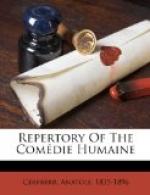CATANEO (Duke), noble Sicilian, born in 1773; first husband of Massimilla Doni. Physically ruined by early debaucheries, he was a husband only in name, living only by and through the influence of music. Very wealthy, he had educated Clara Tinti, discovered by him when still a child and a simple tavern servant. The young girl became, thanks to him, the celebrated prima donna of the Fenice theatre, at Venice in 1820. The wonderful tenor Genovese, of the same theatre, was also a protege of Duke Cataneo, who paid him a high salary to sing only with La Tinti. The Duke Cataneo cut a sorry figure. [Massimilla Doni.]
CATANEO (Duchess), nee Massimilla Doni, wife of the preceding; married later to Emilio Memmi, Prince de Varese. (See Princesse de Varese.)
CATHERINE, an old woman in the service of M. and Mme. Saillard, in 1824. [The Government Clerks.]
CATHERINE, chambermaid and foster sister of Laurence de Cinq-Cygne in 1803. A handsome girl of nineteen. According to Gothard, Catherine was in all her mistress’ secrets and furthered all her schemes. [The Gondreville Mystery.]
CAVALIER, Fendant’s partner; both were book-collectors, publishers and venders in Paris, on rue Serpente in 1821. Cavalier traveled for the house, whose firm name appeared as “Fendant and Cavalier.” The two associates failed shortly after having published, without success, the famous romance of Lucien de Rubempre, “The Archer of Charles IX.,” which title they had changed for one more fantastic. [A Distinguished Provincial at Paris.] In 1838, a firm of Cavalier published “The Spirit of Modern Law” by Baron Bourlac, sharing the profits with the author. [The Seamy Side of History.]
CAYRON, of Languedoc, a vender of parasols, umbrellas and canes, on rue Saint-Honore in a house adjacent to that inhabited by Birotteau the perfumer in 1818. With the consent of the landlord, Molineux, Cayron sublet two apartments over his shop to his neighbor. He fared badly in business, suddenly disappearing a short time after the grand ball given by Birotteau. Cayron admired Birotteau. [Cesar Birotteau.]
CELESTIN, valet de chambre of Lucien de Rubempre, on the Malaquais quai, in the closing years of the reign of Charles X. [Scenes from a Courtesan’s Life.]
CERIZET, orphan from the Foundling Hospital, Paris; born in 1802; an apprentice of the celebrated printers Didot, at whose office he was noticed by David Sechard, who took him to Angouleme and employed him in his own shop, where Cerizet performed triple duties of form-maker, compositor and proof-reader. Presently he betrayed his master, and by leaguing with the Cointet Brothers, rivals of David Sechard, he obtained possession of his property. [Lost Illusions.] Following this he was an actor in the provinces; managed a Liberal paper during the Restoration; was sub-prefect at the beginning of the reign of Louis Philippe; and finally was a “man of business.” In the latter




